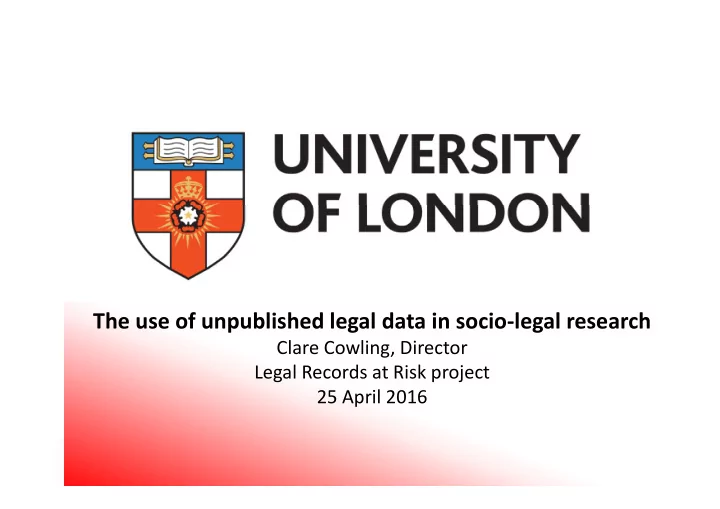

The use of unpublished legal data in socio ‐ legal research Clare Cowling, Director Legal Records at Risk project 25 April 2016
What do we mean by “unpublished legal data”? Business records created by legal practitioners Legal records created in the course of their work by businesses Research data collected by legal scholars Legal records held and made accessible by archive repositories
What is the project’s particular focus? To: • Broaden the concept of "legal" records from their traditional definition as court records, legislation or formal documents such as deeds to records of institutions specialized to law (ISLs), including solicitors, barristers, legal executives, patent agents, licensed conveyancers, court interpreters, arbitrators and ancillary bodies such as legal stationers and law publishers. • Identify ‐ and facilitate the rescue of ‐ legal records of potential research value which may be at risk through globalization, digital obsolescence, neglect, lack of interest or lack of resources to preserve and provide research access to the records.
How will it achieve its objectives? By: • Publishing examples of best practice ‐ and horror stories • Raising awareness among legal information owners of their recordkeeping responsibilities • Working with ISLs to encourage better management of legal records • Working with the research community to identify their needs plus gaps in provision • Working with the archives community to seek practical solutions to resourcing issues We will not collect records but will act as a conduit through which legal records of value (in all formats and media) are identified, preserved and made available for research
Why might this be of interest to socio ‐ legal scholars? • The C20 and C21 have seen enormous changes in the UK’s legal framework (ADR, ABS) • These changes are documented both in government records and in the business records of private sector ISLs • The records of ISLs are not currently being systematically (if at all) preserved for research • So we may have a lopsided (ie government ‐ centric) view of our legal history over the past two centuries • This has implications for the study of social and cultural change.
Would these records be of interest? Assuming they were available…records of, eg: • ADR bodies • ADR cases • Legal membership organisations • Legal regulatory bodies • Legal pressure groups • Law firms • Legal advice groups
What’s the benefit of the project to researchers? • Helping ISLs to identify and better manage their records so that they will survive for posterity • Bringing ISLs with records of value together with archive repositories Resulting in: • Enhanced research access to legal records of value
How can we help? Let us know about.. Issues around records which are not available ie: • Problems locating and accessing relevant records • Do these issues constrain your research or alter your choice of study? • Do secrecy and confidentiality issues hinder your research?
How can you help? Let us know about.. Records which are available ie already in archives: • Difficulties you encounter in finding relevant entries in archives catalogues • Difficulties you encounter in accessing material in archives • Issues around accessing digital records for research
Recommend
More recommend